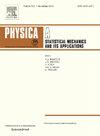Effects of third-order reputation mechanism on the dynamic evolution of cooperation in mixed-games
IF 2.8
3区 物理与天体物理
Q2 PHYSICS, MULTIDISCIPLINARY
Physica A: Statistical Mechanics and its Applications
Pub Date : 2025-01-17
DOI:10.1016/j.physa.2025.130364
引用次数: 0
Abstract
Understanding large-scale cooperative behavior among intelligent individuals is one of the greatest challenges faced by scholars in the 21st century. Real-world complexities shape decision-making, influenced by economic and cultural differences, resulting in inconsistent game preferences. Moreover, rational individuals possess the ability to proactively avoid risks. Therefore, the theoretical framework of mixed-games supplemented with an “isolation strategy” is particularly apt for studying the evolution of cooperative behaviors. To delve deeper into the reputation’s role in evolutionary game dynamics among intelligent individuals, this study proposes a third-order reputation mechanism for comprehensive and objective evaluation of behavior strategies. Under this mechanism, when assessing the merits of an individual’s actions, it is essential to consider not only their own behavior strategy but also the external environment, namely, the reputation of both parties in the game. Simulation results indicate that introducing the third-order reputation mechanism in mixed-game evolution significantly promotes cooperative behavior emergence and prosperity.
求助全文
约1分钟内获得全文
求助全文
来源期刊
CiteScore
7.20
自引率
9.10%
发文量
852
审稿时长
6.6 months
期刊介绍:
Physica A: Statistical Mechanics and its Applications
Recognized by the European Physical Society
Physica A publishes research in the field of statistical mechanics and its applications.
Statistical mechanics sets out to explain the behaviour of macroscopic systems by studying the statistical properties of their microscopic constituents.
Applications of the techniques of statistical mechanics are widespread, and include: applications to physical systems such as solids, liquids and gases; applications to chemical and biological systems (colloids, interfaces, complex fluids, polymers and biopolymers, cell physics); and other interdisciplinary applications to for instance biological, economical and sociological systems.

 求助内容:
求助内容: 应助结果提醒方式:
应助结果提醒方式:


